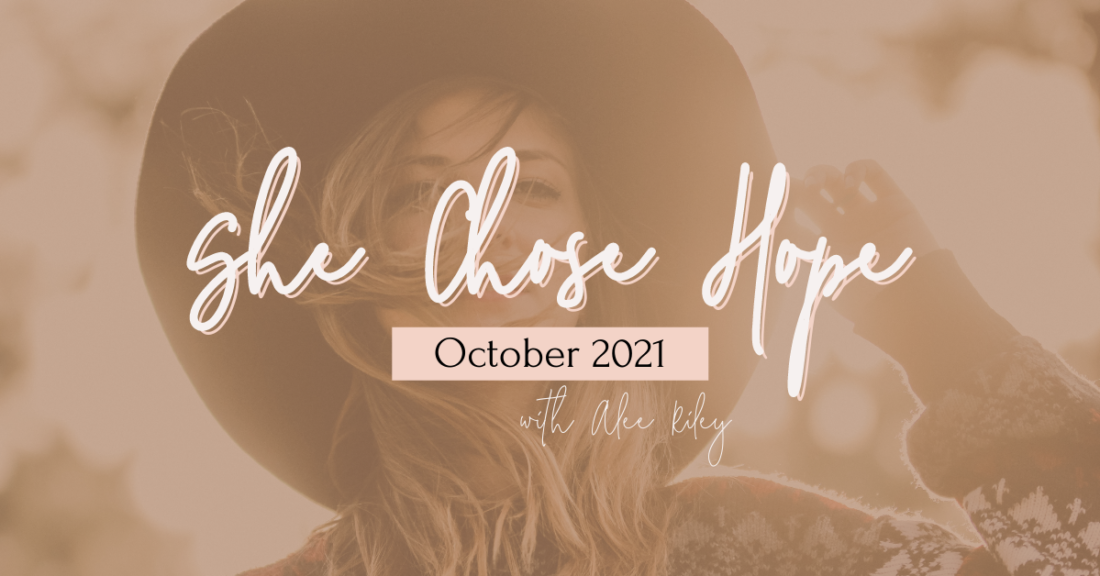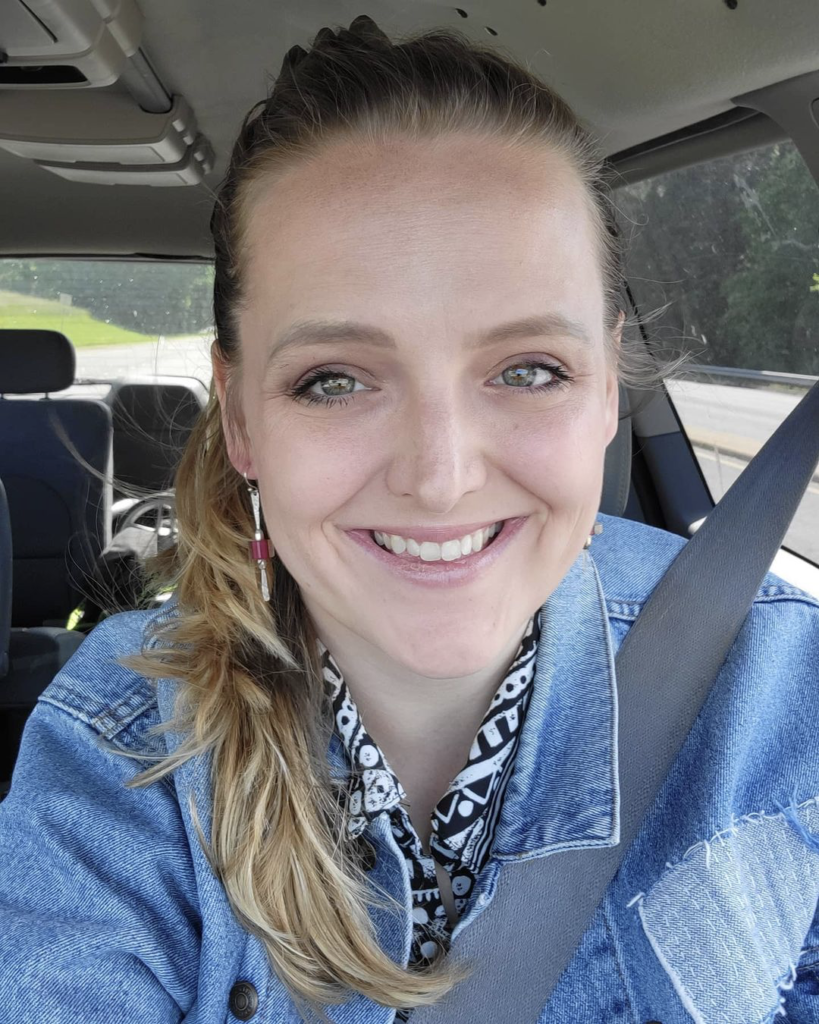
She chose hope introductions
This week’s She Chose Hope story touches on things like withdrawal, mental health, and hope deferred. Alee Riley writes a vulnerable piece about waiting for your heart’s desire, her struggle with crippling anxiety and panic attacks, and the things she has learned about identity and hope along the way.
Alee’s story is part of our She Chose Hope series. If you want to read the other awesome stories, check out the other stories here.
A Dream Deferred – by: Alee Riley
Hope deferred makes the heart sick, (Proverbs 13:12a, ESV)
This is a sentiment I have known since I was an adolescent. I used to read Psalms and Proverbs every single day. On the 13th of the month, my eyes would read what I had observed in the world. I begin to devise my own remedy, or perhaps prevention, of a sick heart: I would no longer care about anything.
My mantra of “I don’t care” or “whatever” bled into everything I did — my studies, my relationships, and my dreams about the future. Even as I tried to break free of this as I got older, I managed to give my husband a complex when we were first dating as I often described my “low expectations” before every. Single. Date. (Ayyye, the poor man. How did we make it to marriage is a mystery to me!)
However, despite my commitment to low expectations, I seemed to form some deep hopes. It turns out, our little human hearts cultivate hope without a really good reason not to do so. Or maybe it’s just me?
Before I knew it, I had set my sights on becoming a teacher. I was going to mold minds and shape hearts and basically change the world like any good teacher archetype would.
I don’t know if you know this or not, but it takes quite a lot of schooling, tests, and free labor to become a teacher in the United States. So, I began the arduous journey.
Reader, it did not go as planned. I did not win the Teacher of the Year Award in my first year. Not even close. I didn’t even make it to Christmas. Twice.
You see, I have also strenuously battled debilitating anxiety.
I vaguely remember my first panic attack. I was 16 years old. I had just returned home from school to an empty house. Before I knew it, the room was spinning and I could not catch my breath. I drove straight to my grandmother’s house in town and somehow weathered that first storm in what would become more than a decade long struggle.
Turns out, the classroom is a breeding ground for triggers for my anxiety.
We all go through so many struggles in life. The invisible and irrational nature of mine crushed my hopes and made my heart sick.
But a desire fulfilled is a tree of life. (Proverbs 13:12b, ESV)
I had my life’s desire in my hands and my poor mental health allowed it to slip through my fingers. I had worked for nearly a decade to see this hope come to fruition.
And then I learned something pretty amazing about hope and identity.
I learned that my sick heart did not stop the world from turning. It did not stop a new day from dawning. My world was shattered, shame covered me, I did not know who I was or why I continued to breath air in and out of my lungs. And yet, the sun just continued to rise and set. Everyday.
And, ever so slowly, I heard the gentle whispers of hope. Not in myself and my capabilities. Far from it. I heard the whispers of His ever-present help and comfort. I learned that everything is okay. That I did not lose favor because I did not fulfill what I believed to be my very purpose.
Over time, delightfully, I felt my affections shifting. The desire of my heart was no longer what I could accomplish, but simply the pleasure of abiding in Christ. I learned, then, to hope not in a far-off future, but in his present presence. My desire could be fulfilled today, right now, if my desire was in Him.
Related: Do you let yourself dreams?
In my weakness, He is strong.
But he said to me, “My grace is sufficient for you, for my power is made perfect in weakness.” Therefore I will boast all the more gladly of my weaknesses, so that the power of Christ may rest upon me.For the sake of Christ, then, I am content with weaknesses, insults, hardships, persecutions, and calamities. For when I am weak, then I am strong.
(2 Corinthians 12:9-11, ESV)
The door is not closed to teaching. I could stand in front of a classroom and teach one day. It is also possible I will never again do that. My hope is not contingent upon either reality. I could never teach again and still live a life of hope. I could live a life riddled with anxiety and depression and still be a person of hope. That is the most freeing truth.
One of the things I have learned in therapy as a remedy for anxiety is to collect facts. One of the things I have learned as a person of faith is to believe in the truths of scripture even when I don’t feel them. So, I choose to hope that I am not alone. That Christ goes before me, beside me, and behind me.
October is a month full of triggers, potholes of despair. Depression sinks into my bones as the days get shorter and darker. My mind spins as the weather dips.
Choosing to hope in the midst of mental health challenges is not easy.
One of the ways I chose hope was agreeing to write about hope in one of my hardest months to be alive. So, here are some truths I have collected to combat the lies that are oh so very loud some days:
— Whenever an anxiety spiral looms, I snatch a thought and I scrutinize it. I measure whether it is rational or irrational; whether it is a false dichotomy; whether it is true, kind or helpful.
We destroy arguments and every lofty opinion raised against the knowledge of God, and take every thought captive to obey Christ.
(2 Corinthians 10:5, ESV)
— I survey my surroundings. I remind myself that I am very much not alone.
He said, “Do not be afraid, for those who are with us are more than those who are with them.”
(2 Kings 6:16, ESV)
— I walk outside. It sounds so simple. But, sometimes the brave act of walking outside and observing everything that nature has to offer is very grounding. I use each of the things I see, hear, smell, taste, and touch to bring me back to this very moment. It reminds me that this present moment is all that we have. It also reminds me that every piece of God’s creation reflects and rejoices in the glory of God.
Related: To the person with broken dreams
The heavens declare the glory of God, and the sky above proclaims his handiwork.
(Psalm 19:1, ESV)
And I heard every creature in heaven and on earth and under the earth and in the sea, and all that is in them, saying, “To him who sits on the throne and to the Lamb be blessing and honor and glory and might forever and ever!”
(Revelation 5:13, ESV)
How many are your works, Lord! In wisdom you made them all; the earth is full of your creatures. There is the sea, vast and spacious, teeming with creatures beyond number – living things both large and small.
(Psalm 104:24-25, ESV)
— I collect and think on these things. Often, it is the very stories of other brave women who choose hope despite all the different sizes and shapes of the very scary things in their life that tempt them to despair. It is the moments that they choose hope that inspire me to continue to do so as well.
Finally, brothers and sisters, whatever is true, whatever is noble, whatever is right, whatever is pure, whatever is lovely, whatever is admirable—if anything is excellent or praiseworthy—think about such things.
(Philippians 4:8, NIV)
Let this* be recorded for a generation to come, so that a people yet to be created may praise the Lord. (Psalm 102:18, ESV *the whole chapter explains what “this” is describing, especially verses 17 and 19)
This list certainly isn’t extensive. But, if you are new to the work of choosing hope, maybe this will help. If you have been choosing hope when despair is more easily accessible for a while now, what tools have you collected to aid you in this holy work? I would love to hear!
ABOUT THE AUTHOR

Alee Riley lives in VA with her husband and 7-month-old daughter. Alee spends most her time slinging diapers and improvising animal noises with a small in-home day care while she decides what she wants to be when she grows up. Whether practicing actively or not, Alee is a teacher at heart. She steals small moments to write — about intersections of faith and doubt, identity and joy, growth mindset and mental health. You can find her at aleeriley.com/ or on Instagram at https://www.instagram.com/aleesriley/